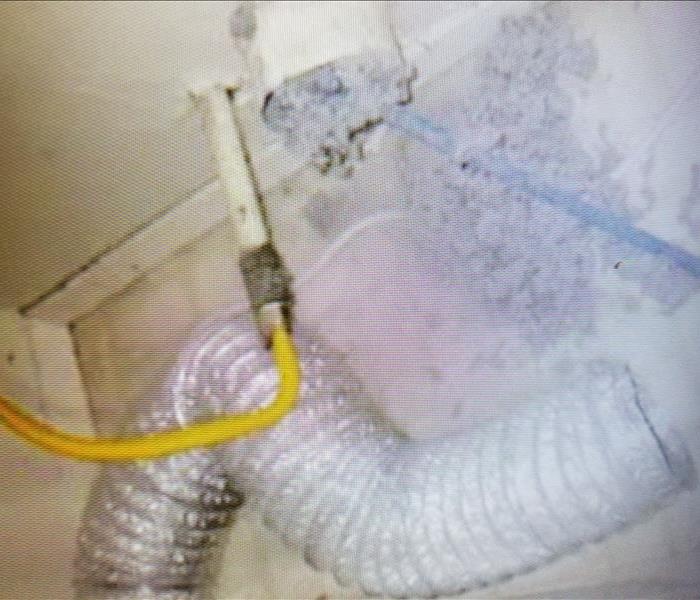Recent Fire Damage Posts
Fire Damage Restoration in Denville – Call SERVPRO
2/13/2024 (Permalink)
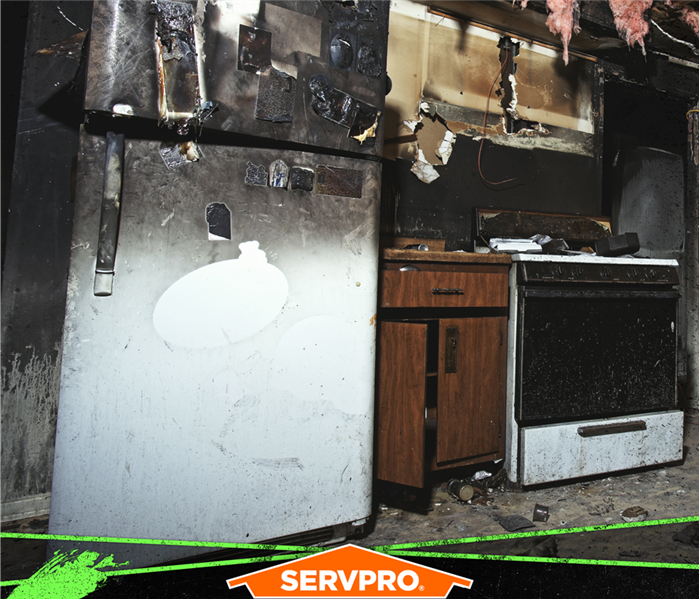 If your Danville home experiences fire damage, call SERVPRO®. We'll make it “Like it never even happened.”
If your Danville home experiences fire damage, call SERVPRO®. We'll make it “Like it never even happened.”
SERVPRO® Provides Fire Damage Removal and Restoration in Denville
Even minor fires can result in significant damage in Denville homes. The fire may have scorched and burned both contents and structural material. The smoke and smoke residues often penetrate all areas of the home, carried by natural air currents and HVAC systems. The Fire Department uses a combination of water and fire retardant chemicals to control and extinguish the fire.
Before SERVPRO can begin restoration of your fire-damaged home in Denville, several steps must be followed to ensure everyone’s safety and mitigate secondary damage caused by the water, fire retardant chemicals, and smoke residues.
Once the fire department has provided the all-clear signal, we inspect and check all rooms to assess safety issues and evaluate the extent of the damage to the immediate area of the fire and the remainder of the home. A plan is developed that includes:
- Removal of fire damaged contents and structures
- Protection of the house by boarding up broken windows, doors and tarps covering roof openings
- Removing water to prevent further secondary damage and mold growth
Once these steps are completed, we remove smoke residues and soot from all surfaces, including ceilings, walls, floors, and contents. It is vital to utilize the appropriate cleaning methods, chemicals and equipment to clean and sanitize every room in the home:
- Cleaners appropriate for the type of residue and surface, e.g., fluffy soot vs greasy residues, porous and non-porous surfaces
- Industrial air scrubbers
- Fogging equipment
Restoration after a fire has damaged your home or business may require replacing drywall, new flooring, new electrical outlets, switches and wiring, and structural repairs. Our SERVPRO team can help manage all of these activities and return your home to its original condition, “Like it never even happened.”
Call for help with fire damage restoration at SERVPRO of North Morris County and nearby areas for assistance. We are Here to Help® 24/7. Call (973) 983-5657.
The Causes of Fire Damage Odors in Denville Properties
3/22/2023 (Permalink)
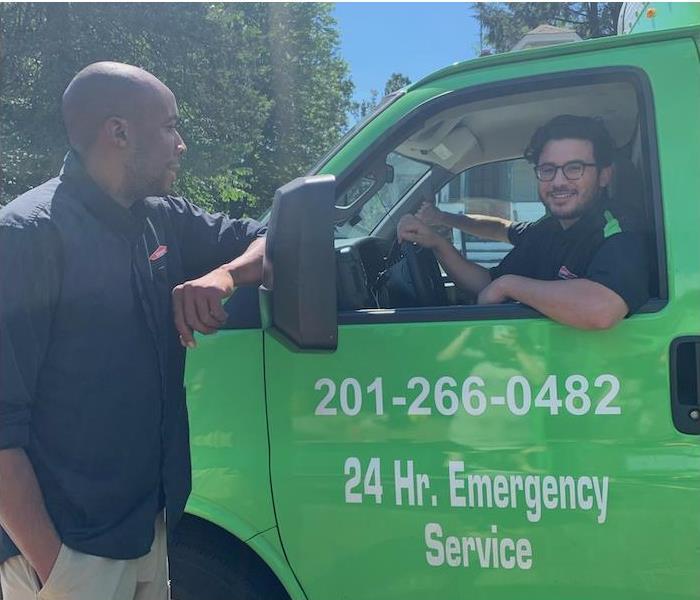 Denville homeowners trust SERVPRO for comprehensive fire and smoke damage cleanup and restoration, "Like it never even happened."
Denville homeowners trust SERVPRO for comprehensive fire and smoke damage cleanup and restoration, "Like it never even happened."
SERVPRO Remediates Denville Homes with 24/7 Fire and Smoke Damage Cleanup
Denville properties can deal with home fire damage at the most inopportune times because, unfortunately, disasters do not occur on a convenient schedule. Even after cleaning up debris and soot, unpleasant odors can be left behind by burnt residues, proteins, and other factors. Fortunately, restoration professionals are available 24 hours a day to address soils and odors.
Denville SERVPRO fire damage remediation specialists typically respond to calls within hours to inspect properties and formulate an actionable and comprehensive restoration plan. This plan includes property inspection and pack-outs if necessary and mitigation, odor control, and rebuilding services following the property owner’s insurance coverage.
How Soot and Smoke Cause Fire Damage Odors
Fire damage odors primarily stem from smoke particles, also known as soot, settling on surfaces. These particles come from burnt materials and can spread through the air, not unlike mold or dust. Soot residues can also attract dirt, so SERVPRO technicians always inspect HVAC systems after a fire, even if it does not require servicing.
Smoke particles and fire odors can come from a wide array of sources, such as:
- Wood, paper, and similarly dry organic materials often leave dry easy-to-remove soils
- Wood finishes, inks, dyes, stains, and adhesives can complicate this when they are burnt
- Rubbers, oils, and plastics, including those used in electrical wiring and appliances, can impart an unpleasant odor and greasy soils that smear with traditional cleaning methods
- Homeowners should be cautious to avoid areas where fire has made contact with items that operate on alkaline or lithium-ion batteries
- Protein residues, which typically come from burnt poultry, red meat, and fish, are especially pungent without specialized cleaners and can easily spread odors via a greasy, nearly-invisible film
When homeowners feel overwhelmed by the prospect of handling these and other fire damage concerns, they can count on SERVPRO techs to remove these on their behalf quickly and thoroughly.
SERVPRO’s Fire and Smoke Odor Control and Remediation
SERVPRO restoration strategies easily mitigate smoke damage, soot deposits, and water damage from fire suppression.
- If water or fire extinguisher residue is present, technicians typically address this first to prevent microbial growth. Fire soils are easier to remove from dry surfaces than wet ones
- Residue cleaning typically proceeds from lightest to heaviest, from the highest point of damage to the lowest. Gentle cleaning with specialized dry cleaning sponges is often sufficient for light, dry soils, which can then be collected with a HEPA-filter vacuum or air scrubber
- SERVPRO technicians can achieve widespread odor control with such tools as the thermal or “hot” fogger, which emits a solvent-based smoke that clings to surfaces as smoke particles do
- Heavy-duty cleaning options are available to address char, including ultrasonic immersion cleaning for delicate objects, abrasion blasting to address charring, and enzyme digesters that convert filmy protein soils to a water-soluble condition free of odors
SERVPRO rebuilding services, such as installing new drywall and carpet, repainting, and sealing stained wood, can further lessen fire odors in a home until they are nonexistent and the property is comfortable and clean. Our team coordinates with property owners and insurance adjusters throughout the restoration process to keep the claims filing process smooth and expedient.
Homeowners can call (973) 983-5657 to receive assistance from SERVPRO of North Morris County, which leaves properties looking and feeling “Like it never even happened.”
SERVPRO Provides Fire Damage Restoration and Odor Removal in Denville
2/14/2023 (Permalink)
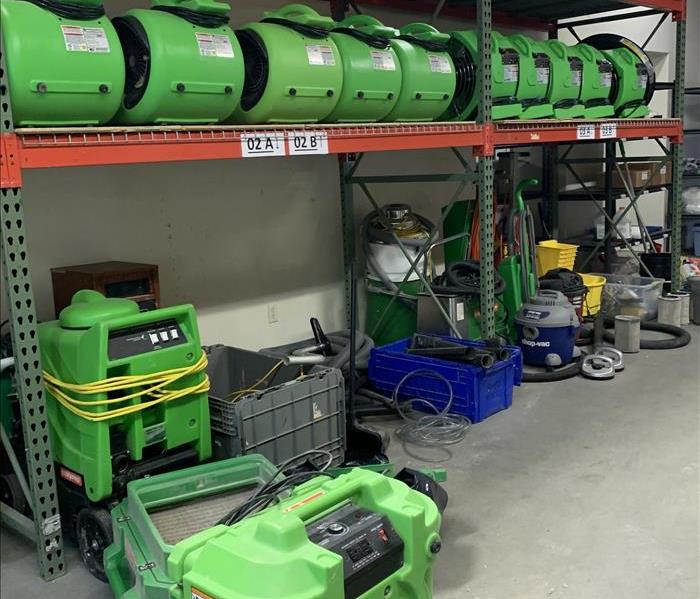 With advanced equipment, SERVPRO restores property to pre-damaged conditions, "Like it never even happened."
With advanced equipment, SERVPRO restores property to pre-damaged conditions, "Like it never even happened."
Cleaning Residues – An Important Part of Fire Damage Restoration in Denville Homes
Fire damage restoration of Denville homes to their preloss condition involves many activities. Fast action and response can significantly affect the amount of secondary damage caused by water, fire retardant elements, and smoke odors throughout the home.
SERVPRO provides fire damage restoration to residents' homes in Denville and surrounding areas. Once the fire department leaves the scene, our experts quickly get to work following a standard industry plan for managing the aftermath of a fire. The activities we follow include:
- Assessment of the damage, type of fire, and types of items burned in the fire
- Emergency board-up of broken windows and doors
- Removal of fire damage debris that cannot be restored, water, and chemicals to help control odors
- Demolition of fire-damaged structures – cabinets, flooring, and wall materials as needed
- Cleaning smoke residues
- Restoration and repair to return your home to pre- damaged condition
Many items can be cleaned and restored. They may be undamaged by fire but have been exposed to smoke odors and residues. Experience has proven that it is less expensive for the homeowner if the contents are cleaned properly and returned to their original condition than replacing them.
SERVPRO applies these cleaning principles when restoring items exposed to smoke residues:
- Residues are located throughout the home
- Identification of the type of residue – fluffy, oily, water, and non-water soluble
- Surface type the smoke residues are on – porous, fabric, semi-porous
- Method of the capture of residues – vacuum, wipe, or a cleaning solution
- Removal of residues from top to bottom and disposal of residues and cleaning materials
SERVPRO technicians work closely with the homeowner and their insurance adjuster to discuss cleaning approaches and identify high-value items from a monetary or personal perspective that require special attention.
Call SERVPRO of North Morris County for fire damage restoration services. We provide service to Denville and nearby areas. We can help 24/7. Call (973) 983-5657.
Handling Fire Damage Restoration in Denville
8/13/2022 (Permalink)
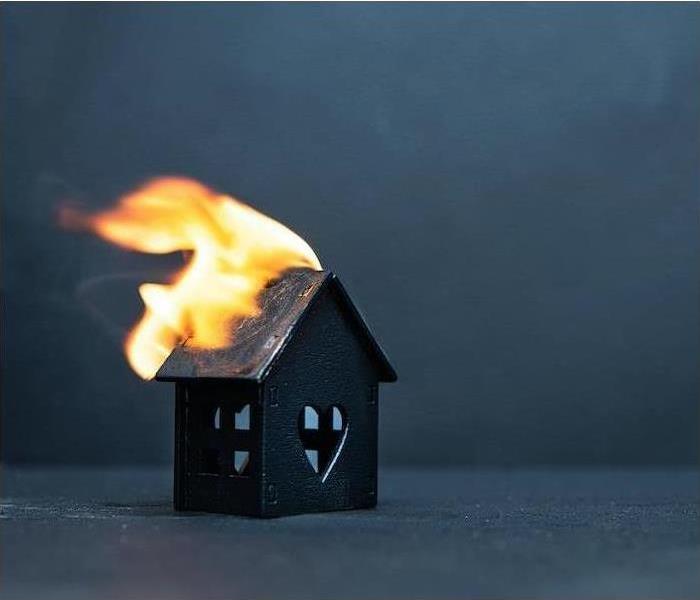 If you find yourself in need of assistance with fire damage remediation, call SERVPRO at (973) 983-5657.
If you find yourself in need of assistance with fire damage remediation, call SERVPRO at (973) 983-5657.
SERVPRO Helps with Fire Restorations in Denville
The results can be devastating whenever a fire breaks out on your property. Even a fire that starts small can quickly grow and consume several of your contents and building materials if not extinguished immediately. Since most residential buildings get made with a large majority of wooden supplies, a house can get ruined in just a few minutes.
During some projects that entail fire damage restoration in Denville, rebuilding your home due to burnt structural components can often become a grueling process. In some situations, our SERVPRO technicians have to deal with the task of removing drywall, wall studs, or roof trusses. As a general rule, if your wooden structural components have a quarter-inch or less charring on the surface, we can take steps to sand or sandblast the burnt material from the surface. But, if the charred material penetrates deeper than a quarter-inch, we must remove and replace the affected building materials or contents.
For example, if only sections of your wall or roof got severely burnt, we can take areas of the charred materials out by cutting them at the part where they get affected. We can then schedule licensed carpenters to rebuild your structure to meet the building code according to New Jersey state law. However, structural issues usually are not the only type of damage caused by a structural blaze.
Other things we can do to restore your home to its pre-damaged state, "Like it never even happened."
- Fire Debris Cleanup
- Smoke Remediation
- Fire & Water Damage Restorations
- Structural Deodorization
- Content Cleaning
Anytime a small blaze becomes very destructive, call SERVPRO of North Morris County at (973) 983-5657.
Fire Restoration Inspections for Rockaway Homes and Businesses
6/29/2022 (Permalink)
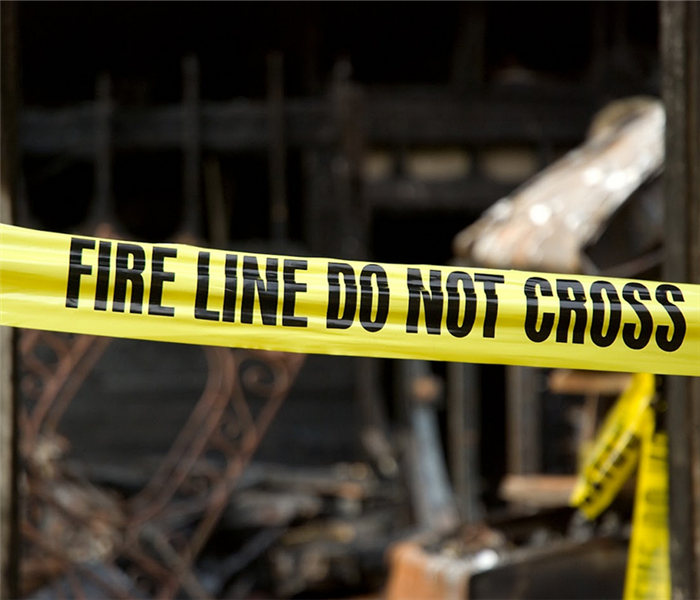 Fire damage needs to be handled quickly and effectively. Team SERVPRO is available anytime and has certified technicians who are ready to help.
Fire damage needs to be handled quickly and effectively. Team SERVPRO is available anytime and has certified technicians who are ready to help.
Inspections Occur Before Fire Restoration Services
Fire and its effect on a property vary greatly from one site to the next. Careful damage assessment should always be conducted by experienced professionals to meet the needs of insurance providers approving a damage claim and to get restoration started quickly.
Creating a Job Scope and Estimate
To get fire restoration underway in your Rockaway home, responding technicians must have an idea of the work and the expected timeline to appropriately manage all the moving parts of the cleanup. Production management of our SERVPRO team conducts detailed damage assessments to create thorough estimations and restoration plans that focus the efforts of the fire damage technicians for:
- Surface cleaning
- Deodorization
- Debris removal
- Structural drying
Inspecting the Structure
Fires can be highly destructive to the structural integrity of your home. Building materials must be inspected to ensure they do not require removal and replacement. Weakened structural elements can collapse or fail, which is a hazard for the home.
Evaluating Damaged Contents
It is important to evaluate the condition of contents in the property as well. Personal belongings can be in the damage path, so at-risk objects are moved to a safer structure area when feasible. If damage has already occurred, on-site and off-site cleaning is needed. The inspection process catalogs an item's current condition to choose one of these actions.
Full-Service Restoration Solutions
We can begin cleaning and restoration once we have the appropriate information about a fire-damaged property. Post-fire recovery combines surface cleaning, loss mitigation, content recovery, and build-back services. We are a full-service recovery provider with FSRT-Certified technicians and a general contractor license.
Inspections play an important role in allowing our SERVPRO of North Morris County team to understand the work's scope and the condition of affected building materials. We provide a fast response to damaged properties to get this evaluation and assessment started to ensure the right tools and personnel reach the site quickly. Call now at (973) 983-5657.
Structure Cleaning During Fire Damage Restoration in Denville
4/18/2022 (Permalink)
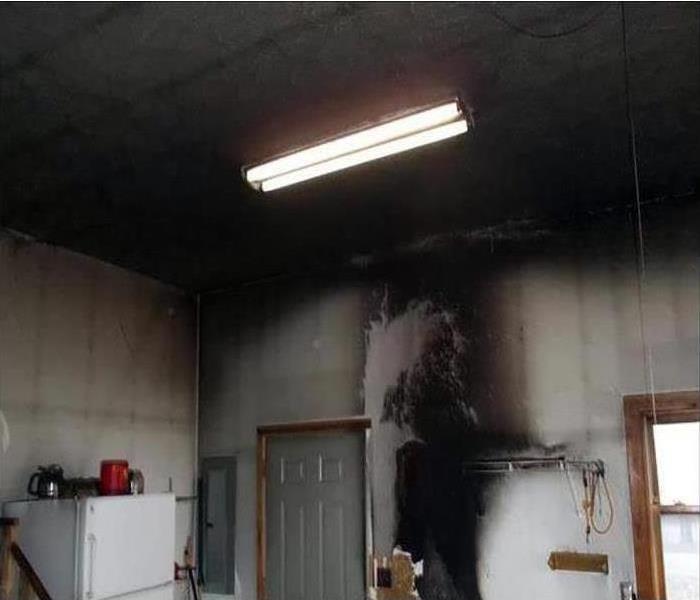 Don’t let fire damage overwhelm you, call the professionals at SERVPRO of North Morris County.
Don’t let fire damage overwhelm you, call the professionals at SERVPRO of North Morris County.
SERVPRO Helps Denville Homeowners Complete Structural Cleanup with No Disruptions
Fires vary in degree of destruction. Fortunately, not all destroy property and belongings, thanks to the fire safety measures and the quick action of our fire departments. However, even a minor kitchen fire incident leaves damage hence the need for cleanup in affected areas and throughout the house. The experience can be emotionally gut-wrecking for most Denville homeowners. SERVPRO helps develop a plan to restore your property to its preloss condition while minimizing disruption.
Structure cleaning during fire restoration in Denville prevents future damage. Damage may continue to occur after extinguishing a fire from soot residue exposure. This is one reason why professional structural cleanup is essential. Once a fire is out, our team conducts a thorough evaluation of the structure to identify areas in need of repair.
Other Measures are Taken to Prevent Structure Damage
- Removal of debris
- Drying out moisture from firefighting efforts
- Removing fire extinguishing residues
Dealing with Charring and Smoke Damage on Wood Surfaces
The intensity of a fire can compromise the strength of a house by charring or scorching wood framing. You find that solid wood starts burning outside due to the heat, and if such charring is deep enough, its structural strength is affected. Our technicians tear down any charred materials that cannot be restored. If framing displays a significant loss of surface material, we ensure any steps taken comply with state and local regulations.
Methods that fix charring and odors
- Wire-brushing
- Scraping
- Abrasive blasting
- Application of a deodorizing pre-sealer
Smoke and soot tend to get absorbed by almost everything in a home. The longer the exposure, the greater the likelihood of replacing the affected items. Soot damage results in staining wood framing, and cleanup can prove challenging as smoke tends to permeate wood surfaces due to its porous nature. Our technicians prefer to remove residues by cleaning. However, when cleaning fails to remove all residues, we may have to seal the surface.
SERVPRO of North Morris County can handle your fire restoration needs effectively. Call us at (973) 983-5657. We're Faster To Any Size Disaster.
Is Fire Damage Permanent for Textured Ceilings and Masonry in Rockaway?
2/25/2022 (Permalink)
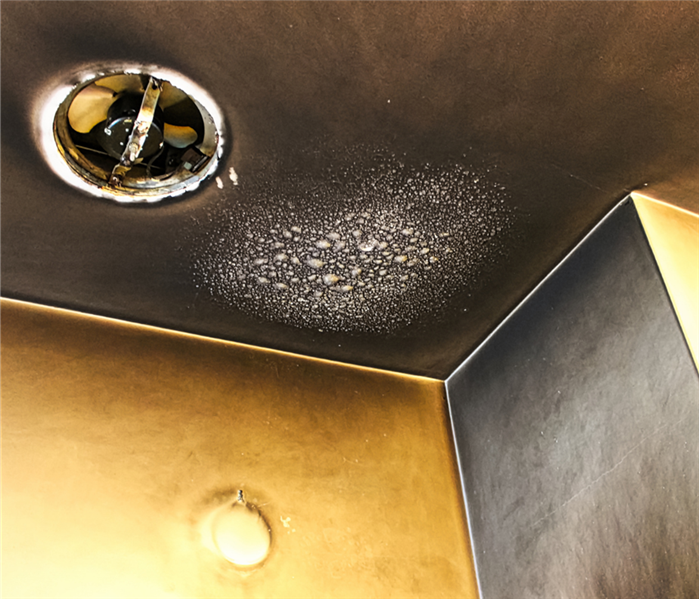 Smoke and soot can reach the remote areas of your home. We can remove the soot and the odors. Call SERVPRO today!
Smoke and soot can reach the remote areas of your home. We can remove the soot and the odors. Call SERVPRO today!
SERVPRO Fire Damage Teams in Rockaway Have Unique Equipment for Textured Surfaces and Masonry
Fires release poisonous gases with huge amounts of soot, ash, and smoke. When confined to an enclosed space, like a home, the temperature changes brought about by fire can increase the air pressure within the room. This increase in air pressure means that soot, smoke, or ash, can be pressed against surfaces where it condenses and becomes challenging to remove. Removing compressed soot is twice as difficult when interior decor features textured ceilings, exposed brickwork, or another masonry because soot is pushed into the tiny cracks and cavities that make up a textured surface. Most homeowners rely on professional services to bring the correct equipment and clear soot, smoke, or ash from their homes after a fire. SERVPRO can help you with:
- Surface cleaning
- Soot Removal
- Specialty cleaning
When looking for fire damage restoration in Rockaway, it is essential to ensure that the company has the correct equipment and training. Licenses and qualifications can be checked using the internet, while larger companies often have better equipment and human resources. SERVPRO has fire damage restoration professionals who hold qualifications from the Institute of Inspection, Cleaning, and Restoration Certifications body to accompany our advanced equipment. When restoring textured surfaces, using high-pressure equipment can speed up the process. Whether it is masonry, exposed brickwork, textured ceilings, a high air pressure pump, or in some circumstances, precision water pressure tools can help to remove staining quickly and easily.
- Removing soots ingrained in surfaces is among the most effective odor control methods in a burnt property.
- High-pressure washers are often portable and can be used on both the interior and exterior of a home.
- Compressed air canisters can help remove the soot without damaging or wetting the surface of bricks and masonry.
Fast restoration relies on advanced equipment. Contact SERVPRO of North Morris County for Fire Damage Restoration at (973) 983-5657.
Surprising Issues in Rockaway Homes That Might Interfere with Fire Damage Restoration
1/30/2022 (Permalink)
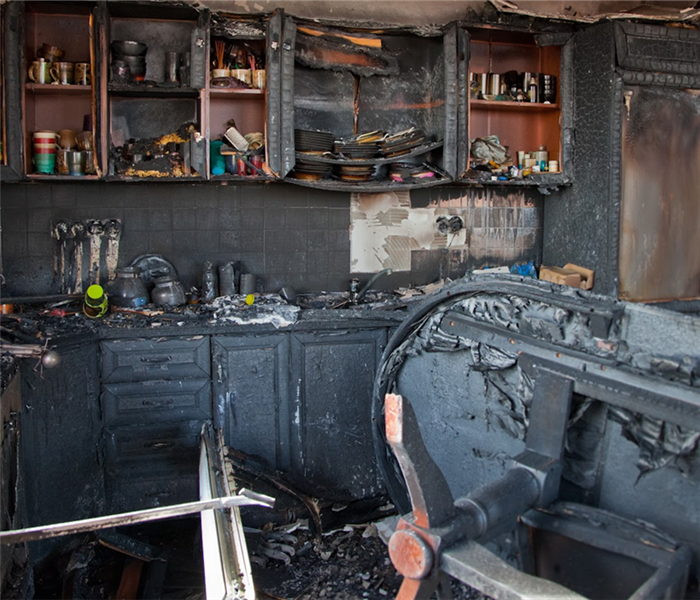 Taking a peek at the charred remains after a house fire can cause some anxiety. Bring the professionals in right away to handle the situation.
Taking a peek at the charred remains after a house fire can cause some anxiety. Bring the professionals in right away to handle the situation.
SERVPRO Is Well Prepared to Handle Power Outage Challenges at Your Rockaway House During Restoration
Taking prompt action in the aftermath of a fire is essential for resuming daily activities at your Rockaway home. Faster restoration can also help ease the costs involved. Although the advantages of a speedier conclusion are clear, many issues can delay the conclusion of a restoration exercise.
Sometimes what interferes with fire damage restoration in a Rockaway home might be minor or unexpected. Only an experienced restoration team such as SERVPRO can anticipate such challenges and thus prevent or resolve them easily.
Some hindrances to fire restoration are centered on electricity and include:
- Power interruption
- Power distribution challenges
- Challenges lighting the work site
- Heating
Fire affects most of the utilities in the house by damaging cables, pipes, and other parts. For example, the insulating materials around electric cables are devastated by heat and flames. Therefore, turning off the power at the mains is necessary until the utilities are inspected and deemed safe to operate, or the damaged electrical is removed.
Turning off power for safety creates other problems since many of the equipment needed to clean or remove materials run on electricity. One way to fix this is by using a generator. The choice of a generator can be challenging. It hinges on the dimensions of your house and accessibility issues such as reaching confined areas. SERVPRO has different generator types, including portable and industrial varieties, to handle every challenge, including 24-hour operation.
Proper heating and lighting are necessary to restore a property after fire damage. Heating helps with drying and protects electronics from cooling to the dew point in a humid environment, which causes secondary damage from corrosion. Sufficient lighting is essential for completing various tasks faster, including cleaning, demolition, and refinishing damaged areas.
SERVPRO of North Morris County has all the resources you need to counter fire damage restoration challenges. Call us at (973) 983-5657. We're Faster To Any Size Disaster.
Where to Get Fire Damage Restoration in the Denville Area
11/29/2021 (Permalink)
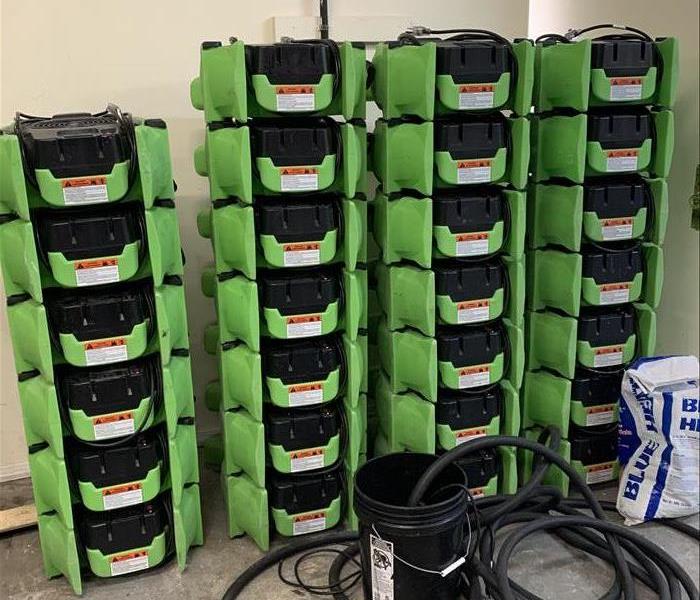 SERVPRO has a large inventory of air movers and other devices to mitigate smoke odors in Denville homes
SERVPRO has a large inventory of air movers and other devices to mitigate smoke odors in Denville homes
SERVPRO Performs Fire Damage Restoration in Denville Homes Responsibly
A fire incident creates the fear of losing many possessions and damaging costly building materials. After such an incident, hiring a responsible fire restoration firm is vital. SERVPRO is your local fire and smoke damage restoration company with a proven track record in bringing homes back to their original condition whenever possible.
We care about your family and can perform fire damage restoration in your Denville residence. After a fire is extinguished, you might be left to deal with continuing destruction because of acid residue, caustic odors, and smoke stains. Our SERVPRO FSRT fire and smoke damage restoration technicians are highly trained and certified to perform various procedures to ensure your property is cleaned effectively. These procedures include:
To perform fire repair, we remove everything that the fire affected from a property. A fire’s effects might spread beyond the area that was initially affected. Ash and smoke can easily spread throughout a structure and cause damage. SERVPRO’s structural restoration service includes cleaning walls, floors, vents, air ducts, and fixtures. We can use general surface cleaners to remove smoke residues from washable surfaces like hard surface furniture, painted ceilings and walls, plastics, paneling, and appliances.
After fire damage, there can be an unmistakable smoke odor. Our SERVPRO team can remove the odors using various products. We consider the type of material to get rid of the smoke odor. For instance, if there is a smoke odor on unfinished wood, we can apply a sealant to it. If the smoke odor is on finished wood, we can strip, sand, and refinish it. In the case of carpets, we can clean them thoroughly. If the smoke odor does not dissipate, our team can replace the carpeting.
Do not let fire damage disrupt your lifestyle. Call SERVPRO of North Morris County at (973) 983-5657. We’re Faster To Any Size Disaster.
Need Smoke and Fire Damage Restoration in Denville – Call SERVPRO
10/1/2021 (Permalink)
 Fire and smoke damage restoration can be very stressful. SERVPRO will work with your insurance company to have your home back to preloss condition.
Fire and smoke damage restoration can be very stressful. SERVPRO will work with your insurance company to have your home back to preloss condition.
Fire Damage Mitigation Reduces Impact on Your Home in Denville
Many consumers don't know where to begin after a fire in their Denville Home. Should they go in and try to save their family keepsakes? Do they begin cleanup? What do they keep, and what must be thrown away because it has been damaged beyond repair? Do they have fire insurance, and does their insurance cover this event? Is it safe to enter the home after the fire? There are so many questions, and it isn't easy to know what to focus on first!
SERVPRO can help with fire restoration in your Denville home or business. We have the experience, the equipment, the training, and the relationships with most major fire insurance companies. We know what to tackle first to minimize the damage from the fire and the efforts of the firemen to extinguish the fire.
One of our primary concerns is safety. Is your home structurally safe to enter? Are there electrical hazards, and is there a danger of slips and falls on slippery surfaces? We are on-site in less than 4 hours from your call to our office. We assess the situation to ensure that all of these factors and more are considered before we enter the home. We want to keep you safe, save as much of your belongings as possible, and minimize the ongoing damage from moisture and fire retardants in your home.
SERVPRO provides the following services to help our customers during emergencies:
- Fire Damage restoration
- Smoke Damage Remediation
- House Fire Cleanup
- Work closely with the Client and their Insurance Company
Call SERVPRO of North Morris County for fire restoration in Denville and surrounding areas. We can help 24/7. Call (973) 983-5657.
Can SERVPRO Help Denville Homeowners in Fire Damage Restoration?
8/24/2021 (Permalink)
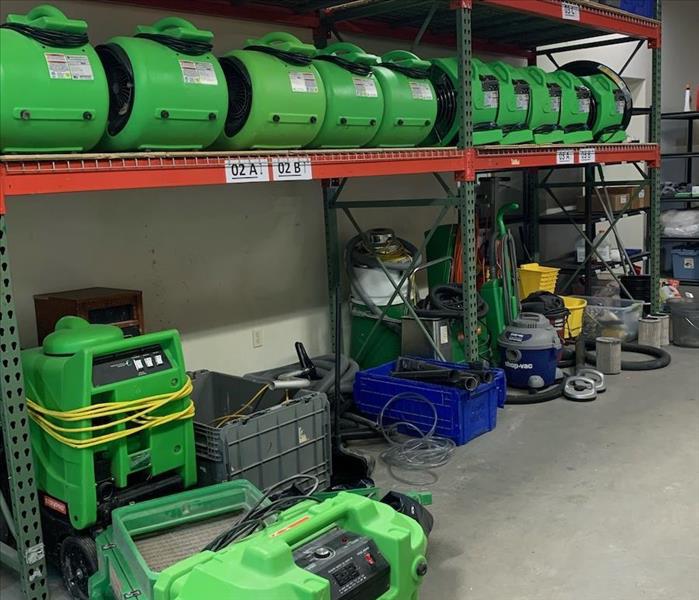 Fire and soot damage restoration services by SERVPRO are second to none. Call now for the help you need.
Fire and soot damage restoration services by SERVPRO are second to none. Call now for the help you need.
SERVPRO Can Handle Any Size Fire Damage Restoration in Denville
One of the biggest challenges in fire damage restoration of Denville homes is cleaning the smoke and soot residues deposited on walls and ceilings. SERVPRO technicians use various cleaning methods on ceilings and walls depending on the type of surface and extent of the fire and smoke damage.
SERVPRO technicians use both dry and wet cleaning to remove smoke and soot residues during fire damage restoration of your Denville home. While dry cleaning is used on non-washable surfaces, wet cleaning is a method of choice of SERVPRO techs to clean painted walls and ceilings. The most significant advantage of wet cleaning is that the water-based cleaning product has a decisive cleaning action and can cut through sticky and difficult-to-remove residues.
How do SERVPRO Techs Clean Painted Walls During House Fire Cleanup in Denville?
Many painted surfaces in your Denville home can be wet-cleaned by SERVPRO techs. The most common paints used in residential buildings include-
- Water-Soluble Paints: These might have latex or vinyl plastic as a base and can be cleaned with water-based cleaning agents if the paint has been cured for at least 30-90 days. That said, as such paints tend to absorb smoke, they need to be pre-cleaned with a dry cleaning sponge before using wet cleaning.
- Oil-soluble paints: Also known as enamels, these are commonly found on woodwork and trim. Gloss and semi-gloss paints fall under this category as well. Oil-soluble paints are much easier to wet-clean than water-soluble paints.
Call SERVPRO of North Morris County at (973) 983-5657 to consult with one of our experts regarding your restoration needs.
Fire Damage Restoration of Your Rockaway Home is a Job for the Professionals
6/10/2021 (Permalink)
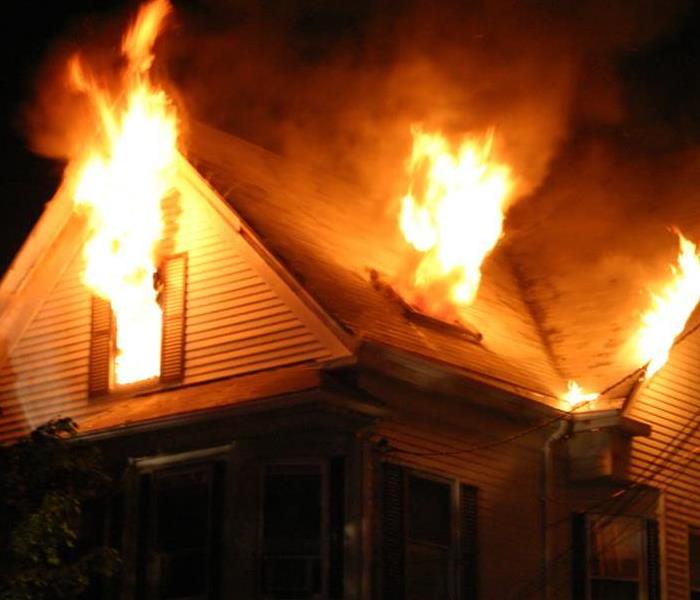 SERVPRO of North Morris County is always here especially with an unexpected fire damage.
SERVPRO of North Morris County is always here especially with an unexpected fire damage.
Why is SERVPRO is One of the Most Trusted Fire Damage Restoration Companies in Rockaway?
Fire damage restoration of your Rockaway home is a complex process involving several steps. Any neglect during the house fire cleanup process can cause irreparable damage and worsen an already bad situation. SERVPRO technicians use their years of experience and expertise to meticulously plan and execute the restoration process to get your home to a state "Like it never even happened."
SERVPRO restorers use scientific principles to clean the soot and smoke residue during fire damage restoration of your Rockaway home. We ensure that the methods we employ during the fire and smoke remediation don't cause any secondary damage.
Cleaning Smoke and Soot Residue from Fire Damaged Homes in Rockaway
SERVPRO fire damage restoration experts use various cleaning products to remove the smoke and soot residue to restore your Rockaway home to the preloss condition.
- Dry cleaning solvents: These are petroleum-based solvents used to clean draperies and fabrics that can't withstand wet cleaning agents. SERVPRO restorers use these commonly to clean lightly soiled fabrics during smoke remediation; these solvents can't be used for textiles with rubberized backing
- Volatile dry solvents: These solvents evaporate quickly, leaving no residue. Smoke, soot, and carbon particles suspend in these solvents and can be removed easily.
- Wood oil soaps: These are mild detergents and don't contain harsh alkalis. Wood oil soaps are ideal for cleaning light soot from finished wood surfaces.
- Furniture polishes: They contain lemon oil, mink oil, and silicone that provide a combined action of cleaning, polishing, and wax protection
Call SERVPRO of North Morris County at (973) 983-5657, round the clock for fire damage restoration services in Rockaway.
How We Target Our Denville Fire Damage Restoration Techniques
5/25/2021 (Permalink)
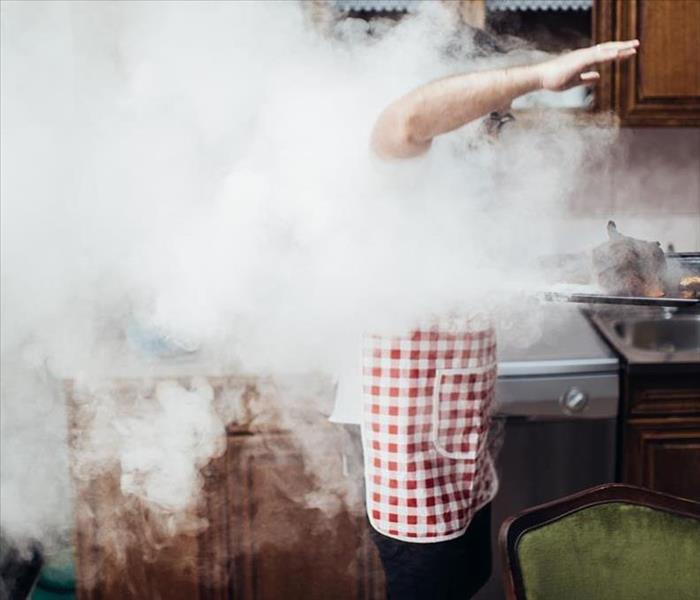 Even the smallest fire incident can cause large problems. Call SERVPRO of North Morris County to insure no further issues arise.
Even the smallest fire incident can cause large problems. Call SERVPRO of North Morris County to insure no further issues arise.
Complex Denville fire damage restoration problems require a bit of science to understand
Depending on where the fire and smoke damage travels in your home, SERVPRO technicians may need to focus on specific strategies. Figuring out where fire residues are most likely to accumulate requires a bit of science and a lot of experience.
At the beginning stages of a fire damage restoration project in Denville, a SERVPRO inspector deduces the places that are liable to accumulate more Smoke Damage. Our immediate priority is often an area that does not have much damage yet but may develop problems over time. For differing reasons, these areas may include:
- Ventilation
- Doors and windows
- Metal appliances
Early on, fire damaged homes typically have the most issues near the fire, on ceilings, and along the upper portions of walls. These patterns are due to the effects of rising heat and pressure. With time, however, some smoke residues may fall away and migrate to other areas. Ventilation naturally picks up and spreads airborne smoke particles across the home. Another important effect is the migration of hot material to cold surfaces. During and after the fire, hot smoke may seek out cooler parts of the home, including windows, doors, and metallic materials.
SERVPRO of North Morris County responds 24/7 to local calls for help with fire damage cleanup. Contact us at (973) 983-5657.
What Causes Most Fire Damage in Denville?
5/5/2021 (Permalink)
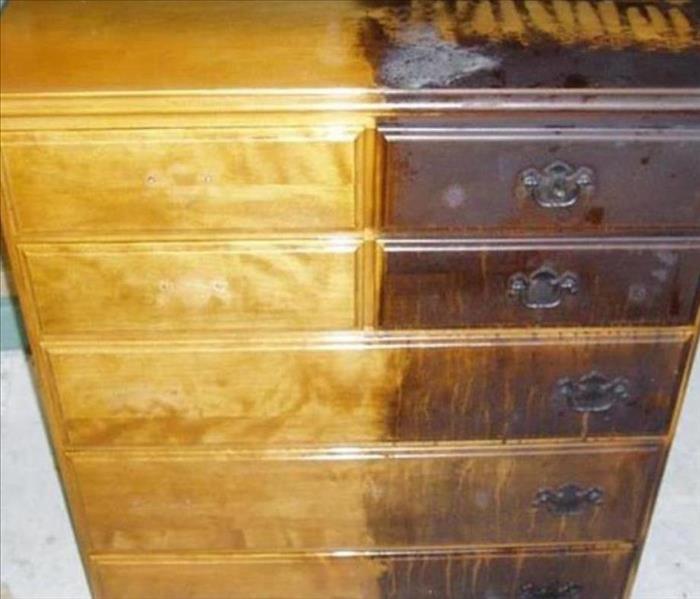 Usually, not all is lost after a fire, We restored this fire damaged dresser and we can restore your belongings, too!
Usually, not all is lost after a fire, We restored this fire damaged dresser and we can restore your belongings, too!
Most Fire Damage in Denville Results from Common Household Accidents
The most daunting aspect of house fires is that common household accidents often cause them. Simultaneously, this characteristic also makes them very preventable by simply maintaining a certain level of situational awareness and avoiding careless behavior.
SERVPRO, a Denville fire damage restoration company, routinely remediates fire damaged homes. Through their years of effectively performing house fire clean up and smoke remediation work, our skilled technicians have found that local residential fires often result from one of the following causes:
- Cooking mishaps, including out of control grease fires and other accidents occurring when cooking food is left unattended
- Smoking accidents that happen when residents fall asleep while smoking or otherwise drop a burning cigarette
- Improperly stored heater or cooker fuel
- Knocked over space heaters
- Dropped or overturned candles
- Children playing with matches, lighters, or gas/electric range burners
Fortunately, through vigilance and care, homeowners can usually avoid the house fire risk.
With all that said, if you ever do suffer fire damage, call your helpful neighborhood SERVPRO of North Morris County at (973) 983-5657.
Does Cleaning Remove Smoke Damage in Rockaway Homes?
4/7/2021 (Permalink)
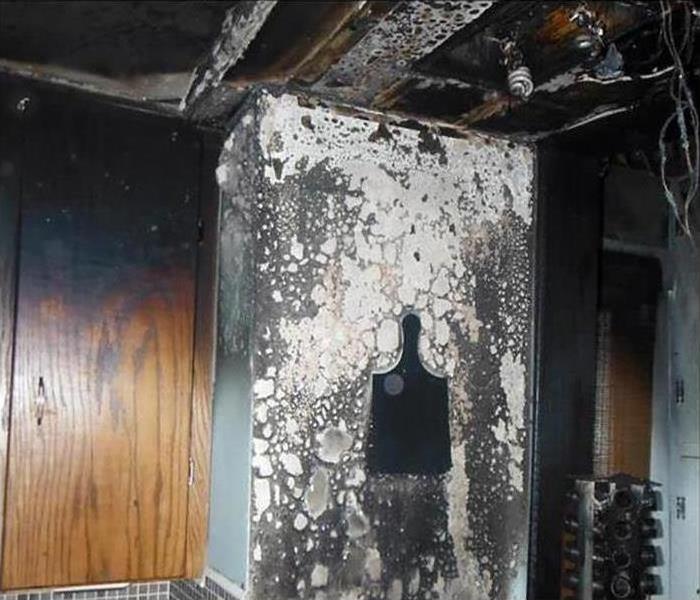 Rockaway homeowners trust SERVPRO for comprehensive fire and smoke damage cleanup and restoration, "Like it never even happened."
Rockaway homeowners trust SERVPRO for comprehensive fire and smoke damage cleanup and restoration, "Like it never even happened."
House Fire Clean Up requires potent cleaning products and strategies in Rockaway properties.
Smoke damage can be one of the most hazardous post-fire effects for homeowners to contend with when extinguishment occurs. Air filtration can reduce circulating fire and soot damage particles, but often not before they impact exposed surfaces.
Are Soot and Smoke Damage a Challenging Obstacle in Rockaway Homes?
Fire and soot damage in Rockaway houses can be complicated and involved to remove, even with the advanced fire restoration practices that our SERVPRO team delivers. We provided proven (IICRC) The Institute of Inspection, Cleaning and Restoration Certification technicians. We rely most on a combination of trusted methods and products to loosen soiling on surfaces and oily residues. Lessening the severity of soot on building materials and contents can allow for more efficient smoke damage removal. Some of these cleaning practices include:
- Surface cleaning
- Soda blasting
- Solvents, both water, and oil-based
- Controlled demolition
Removing smoke, soot, and odors from homes is a priority for our SERVPRO of North Morris County team and we leave you with the feeling “Like it never even happened.” Give us a call for post-fire damage restoration today at (973) 983-5657.
Let's Talk Temporary Home Heating
1/28/2021 (Permalink)
 What's wrong with this picture? There are flammable materials within the 3-foot perimeter of this electric heater!
What's wrong with this picture? There are flammable materials within the 3-foot perimeter of this electric heater!
The temperatures are below freezing and it’s downright chilly in here! We don’t all live in super-efficient, temperature-perfect homes. For some of the drafty rooms and spaces in our homes, we may be tempted to choose space heaters to chase the chill during these cold winter months. If this is something you have thought about, or already have in use, a few words of caution are in order!
According to the National Fire Prevention Association and based on 2014-2018 annual averages:
- Most home heating fire deaths (81%) involved stationary or portable space heaters.
- The leading factor contributing to home heating fires (25%) was failure to clean, principally from solid-fueled heating equipment, primarily chimneys.
- Half of the home heating fire deaths were caused by having heating equipment to close too things that can burn, such as upholstered furniture, clothing mattresses or bedding.
- Nearly half (48%) of all home heating fires occurred in December, January and February.
Source: NFPA Applied Research
Space heaters, wood stoves and fireplaces can, when used very prudently, be helpful in keeping our living spaces warm and toasty this winter. Take the time to review the safety tips from the NFPA by downloading this tip sheet:
https://www.nfpa.org//-/media/Files/Public-Education/Resources/Safety-tip-sheets/Heating_Safety.pdf
The NFPA also has a video, which although it is dated, is nonetheless informative and somewhat amusing. Check it out here: https://youtu.be/5BqR4WNd3lA
Above all, don’t take you and your family’s safety for granted. Review the cautions and stay safe and warm this season.
If you should experience a fire or smoke in your home or business, gather your family, leave the premises immediately and call 911 from outside. Then call SERVPRO® of North Morris County to assist you in returning your premises to pre loss condition. We are available to serve you 24/7/365 @ 973-983-5657.
Pumpkin Spice and the Dangers of Unattended Cooking
9/29/2020 (Permalink)
 Always set a timer when cooking
Always set a timer when cooking
Does your kitchen smell like pumpkin spice? Do you have a fabulous recipe for pumpkin bread? Is this post making you hungry? Did you know that next week is Fire Prevention Week? Have you ever experienced a fire in your kitchen?
We are hoping the answer to all of the above is yes, with the exception of the last question. No one wants to experience any size fire in their home. An ounce of prevention, as the saying goes, is worth a pound of pumpkin spice. Oh wait, it’s worth a pound of cure!!
Cooking “ incidents”, let’s call them, are the leading cause of household fires in the US according to the National Fire Protection Association. Most of these “incidents” are due to unattended cooking. Homeowners who are distracted, busy or sleepy tend to walk away from the task at hand and that’s where the trouble starts. Following the NFPA’s guidelines at all times can prevent a fire in your home.
- Do Not walk away from the stove while grilling, frying, boiling or broiling
- Check often on foods that are baking or roasting
- Use a timer to remind you when the cooking time is through
- Do Not cook when you are sleepy or under the influence of alcohol
- Keep flammable materials away from the stove
For more tips on prevention, visit https://www.nfpa.org/Public-Education/Staying-safe/Preparedness/Fire-Prevention-Week
If you experience a kitchen fire, or any other type of fire in your residence or business, call us at SERVPRO™ of North Morris County anytime 973-983-5657! We are here to help!
Wildfire Community Awareness Day
4/27/2020 (Permalink)
May 2, 2020 was set aside as Wildfire Community Preparedness Day. Due to the social distancing restrictions set forth by Governor Murphy to flatten the curve of COVID-19 infections, any community events will not take place at this time However, this is still a good time for your family to plan and execute a homeowners property protection plan for the outside of your home.
Living amidst forests which are a source of natural beauty, we must also be aware of its danger, specifically the danger of wildfires that can spread quickly and without warning. According to Smokey the Bear, ignited embers from a wildfire can travel a mile or further.
Just as in any type of community disaster or emergency, preparedness is the key to preventing loss of life and property.
The National Fire Protection Association has a short, informational video on simple ways to create a fire free zone starting at 0 to 5 feet from your home and expanding out 100 feet where applicable. Many of these procedures can be accomplished by homeowners or landscapers and other professionals. These best practices will help To access this video, go to their website here: https://www.nfpa.org/Public-Education/Fire-causes-and-risks/Wildfire/Firewise-USA
For additional information and Wildfire Safety Tips, visit: https://www.nfpa.org/Public-Education/By-topic/Wildfire/Wildfire-safety-tips
Why Do I Still Smell Smoke?
4/8/2020 (Permalink)
Even a small fire can cause odors for years to come if the affected areas are not properly cleaned and deodorized. Fire, smoke, and soot damage in your home or business can create unpleasant and potentially permanent problems.
As various materials burn, smoke produced travels throughout your home or business leaving odorous residues and deposits on surfaces and out of the way places. Unless fast, professional action is taken, these residues and deposits can cause permanent damage to contents and may result in resurfacing odors.
With technicians certified by the Institute of Inspection, Cleaning and Restoration (IICRC), SERVPRO® of North Morris County professionals provide specialized services that can rid your home or business of offensive odors left by fire or smoke damage. SERVPRO® professionals do not cover up lingering odors with a fragrance; they seek out and remove the source of the odor. Once the source is found, SERVPRO’s own proprietary line of cleaning products is used to treat and prevent the odor from returning. Any restorable item in affected areas will also be professionally cleaned and deodorized, including furniture, draperies and upholstery, electronics, art, flooring, walls, ceilings, HVAC air ducts and more.
The Team at SERVPRO® of North Morris County will explain the various deodorization methods available and which one will work best for you.
If you or one of your customers suffer a fire damage or some other accident and require deodorization services, call us: SERVPRO® of North Morris County 973-983-5657.
If your home or office has a stubborn odor that refuses to go away, we’ll help make it “Like it never even
happened.”
Rapid Fire and Smoke Damage Response
2/3/2020 (Permalink)
Have you suffered a fire or smoke emergency in your home or business? The first 48 hours after a fire can make the difference between restoring versus replacing damaged property and personal belongings. Rapid response and timely mitigation can help prevent fire damage from creating long-term problems.
We understand returning to normal is your primary concern. SERVPRO of NORTH MORRIS COUNTY response teams are trained in caring for both you and your property. By responding quickly with a full line of fire cleanup and restoration services, we can help you get your home or business back up and running quickly and help protect your property and belongings. If your home or business suffers fire damage, call us at 973-983-5657 to help make it “Like it never even happened.”
Think that Fire is Out? Guess Again!
2/3/2020 (Permalink)
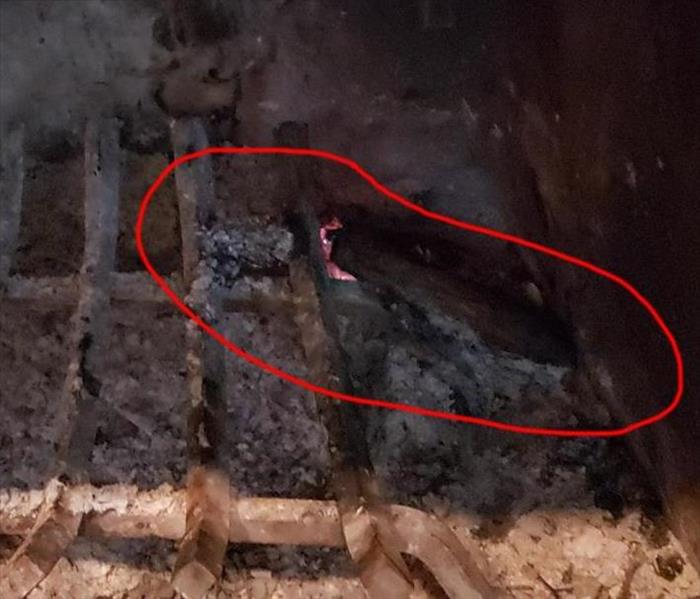 Even a small, remaining ember can re-ignite a fire!
Even a small, remaining ember can re-ignite a fire!
Ready to retire for the night? Think that the fire is out? Guess again! A homeowner in our neighborhood scooped the ashes out of his fireplace before bedtime and stored them in the garage in a garbage bin. Within hours, the garage was engulfed. Thankfully he and his family were able to escape because the smoke detectors in his home were operational.
Fireplace coals can remain hot enough to start a fire for up to three days, always wait before removing the ashes. When you are sure no embers remain, use the metal shovel that comes with most fireplace tool sets and scoop the ashes into a metal container. Never use a vacuum to clean up ashes, because live coals may remain in those ashes. Store the container far from combustible materials, preferably outside. Place the ashes in the trash on pick-up day to reduce any further fire risk.
Choosing A Fire Extinguisher
9/25/2019 (Permalink)
It is important that when choosing a fire extinguisher, you know which one to select. Here's a brief breakdown:
Class A: This is the most common extinguisher and can be used to put out fires in ordinary combustibles such as cloth, wood, rubber, paper and many plastics.
Class B: Used on fires involving flammable liquids, such as grease, gasoline and oil.
Class C: Designed for fires involving appliances, tools, or other equipment electrically energized or plugged in.
Class D: For use on flammable metals; often specific for the type of metal in question. These are typically found only in factories working with these metals.
Class K: Intended for use on fires that involve vegetable oils, animal oils, or fats in cooking appliances. These extinguishers are generally found in commercial kitchens, but are becoming more popular in the residential market for use in kitchens.
Smoke Alarms: Life Savers
2/25/2019 (Permalink)
Smoke alarms save lives when properly installed and maintained, according to the National Fire Protection Association (NFPA).
In homes, smoke alarms should be in every bedroom and on every level, including the basement. In office and commercial environments, check your state requirements or contact your local Fire Marshall to help ensure all codes are met
Test smoke alarms monthly using the test button. Smoke alarms with non-replaceable batteries need the entire smoke alarm unit replaced every ten years. Other alarms need batteries replaced every year and the unit replaced every ten years. If the alarm chirps signaling low battery, take the proper steps to replace the unit or the batteries immediately. Never disable or remove the battery from an alarm. Almost half of fires where smoke alarms were present but did not activate had missing or disconnected batteries (NFPA).
In larger commercial facilities, hard wired or wireless smoke alarms offer benefits such as not needing to be tested as often and activating throughout the entire building if smoke is detected in just one area (NFPA).
If you need help installing, testing or changing batteries in your smoke alarms, contact your local fire department, an electrician or the American Red Cross.
Be sure your home or workplace has a fire emergency plan in place and conduct regular fire drills.
Portable Fire Extinguishers
2/18/2019 (Permalink)
Portable fire extinguishers can be life and property saving tools when used correctly. In order to operate an extinguisher, the National Fire Protection Association (NFPA) suggests remembering the word PASS:
Pull the pin. Hold the nozzle pointing away from you and release the locking mechanism.
Aim low. Point the extinguisher at the base of the fire.
Squeeze the lever slowly and evenly.
Sweep the nozzle from side-to-side. Read the instructions on the fire extinguisher and become familiar with them before a fire breaks out.
Remember, extinguishers do have limitations. It is also important to ensure you have the correct type of extinguisher for your facility. To find more information on choosing the appropriate class of extinguisher, please visit the NFPA website at nfpa.org.
Emergency Fire Damage Tips
2/13/2019 (Permalink)
These emergency tips will assist you in taking proper action until we arrive. Follow these DOs and DON’Ts to help reduce damage and increase the chances of a successful restoration.
DO:
-Limit movement in the home to prevent soot particles from being embedded into carpet and avoid tracking.
-Keep hands clean. Soot on hands can further soil upholstery, walls and woodwork.
-If electricity is off, empty freezer and refrigerator completely and prop doors open to help prevent odor.
-Wipe soot from metal kitchen and bathroom faucets, trim and appliances.
-If heat is off during winter, pour RV antifreeze in sinks, toilet bowls, holding tanks and tubs to avoid freezing pipes and fixtures.
-Remove soot particles from plants with a damp cloth.
-Change HVAC filter, but leave system off until a trained professional can check the system.
-Tape double layers of cheesecloth over air registers to stop particles of soot from getting in or out of the HVAC system.
DON’T:
-Don’t attempt to wash any walls or painted surfaces without first contacting us.
-Don’t attempt to shampoo carpet, rugs or upholstered furniture without first consulting your us.
-Don’t attempt to clean any electrical appliances (TV sets, radios, etc.) that may have been close to fire, heat or water without first consulting an authorized repair service.
-Don’t consume any food or beverages that may have been stored close to fire, heat or water. (They may be contaminated.)
-Don’t turn on ceiling fixtures if ceiling is wet. Wiring may be wet or damaged and cause electrical shock and air movement may create secondary damage.
-Don’t send garments to the dry cleaner. Improper cleaning may set in smoke odor.
Celebrate Safely This Holiday Season
12/10/2018 (Permalink)
Pretty lights, candles and
decorations are just a few of
the items bringing charm
and cheer to the holiday season—
however, if they are not used carefully
your holidays may go from festive to
frightening.
The American Red Cross offers the
following safety tips to help greatly
reduce the fire risk in your home or
business this holiday season.
-Place Christmas trees, candles
and other holiday decorations at
least three feet away from heat
sources like fireplaces, portable
heaters, radiators, heat vents
and candles.
-Make sure light strings and
other holiday decorations are
in good condition. Do not use
anything with frayed electrical
cords and always follow
the manufacturer’s
instructions.
-Always unplug tree and holiday
lights before leaving the
property or going to bed.
-Never use lit candles to decorate
a tree. Always extinguish
candles before leaving the room
or going to bed.
-Use only sturdy tree stands
designed not to tip over. Keep
curious pets and children away
from Christmas trees.
-Keep anything that can catch
fire—pot holders, oven mitts,
wooden utensils, paper or
plastic bags, food packaging and
towels or curtains—away from
your stove top.
-Designate one person to
walk around your property
to ensure all candles and
smoking materials are properly
extinguished after guests leave.
We wish you a safe and
happy holiday season!
Safety First: Before the Feast
11/12/2018 (Permalink)
Each November, families gather
to celebrate Thanksgiving by
preparing a delicious feast,
but if you don’t practice safe cooking
habits, your happy holiday could
become hazardous very quickly.
According to the National Fire
Protection Association, cooking is
the main cause for home fires and
injuries, with Thanksgiving being the
peak day for cooking-related fires.
Review the following safety
tips to help ensure you can
enjoy a safe holiday.
-Never leave cooking food
unattended–stay in the
kitchen when frying, grilling
or broiling food. If someone
must leave the kitchen for even
a short period of time, they
should turn off the stove.
-Check food regularly while
cooking and remain in the
home while cooking. Use
a timer as a reminder that
the stove or oven is on.
-Keep the kids away from the
cooking area. Enforce a “kid-free
zone” and make them stay at least
three feet away from the stove.
-Keep anything flammable–pot
holders, oven mitts, wooden
utensils, paper or plastic bags,
food packaging and towels or
curtains—away from the stove,
oven or any other appliance in
the kitchen that generates heat.
-Do not wear loose clothing or
dangling sleeves while cooking.
-Clean cooking surfaces on a regular
basis to prevent grease buildup.
-Purchase a fire extinguisher to keep
in the kitchen. Contact the local
fire department for training on
the proper use of extinguishers.
-Always check the kitchen before
going to bed or leaving the home
to make sure all stoves, ovens, and
small appliances are turned off.
-Install a smoke alarm near the
kitchen, on each level of the
home, near sleeping areas and
inside and outside bedrooms.
Use the test button to check
it each month. Replace all
batteries at least once a year.
Have a safe and happy holiday season!
FASTER TO ANY SIZE DISASTER
11/9/2018 (Permalink)
Did you know cooking
equipment is the leading
cause of residential fires?
As the holidays begin, fire precautions
should as well.
A property owner experiences a flood
of emotions when a fire ravages their
business or home. Fear, uncertainty,
stress and doubt about the future of the
property can be overwhelming to the
property owner long after the flames
have been extinguished and the smoke
has cleared.
After the first wave of heroes have
rescued the property, let us
help you restore the property.
Combining rapid response, the
utmost professionalism and open
communication, we strive to restore
not only the home or business, but to
restore the customer’s peace of mind, as
well.
The National Fire Protection
Association (NFPA) offers the following
eye-opening statistics on fires:
-475,500 structure fires
were reported in the
United States in 2016.
-These fires caused $7.9 billion
in property damages.
-One structure fire was
reported every 66 seconds.
If the unthinkable happens and a fire
strikes, give the experts at SERVPRO a call. We’ll help make it “Like it never even happened.”
Smoke Alarms: Life Savers
9/17/2018 (Permalink)
Smoke alarms save lives when properly installed and maintained, according to the National Fire Protection Association (NFPA).
In homes, smoke alarms should be in every bedroom and on every level, including the basement. In office and commercial environments, check your state requirements or contact your local Fire Marshall to help ensure all codes are met.
Test smoke alarms monthly using the test button. Smoke alarms with non-replaceable batteries need the entire smoke alarm unit replaced every ten years. Other alarms need batteries replaced every year, and the unit replaced every ten years. If the alarm chirps signaling low battery, take the proper steps to replace the unit or the batteries immediately. Never disable or remove the battery from an alarm. Almost half of fires where smoke alarms were present but did not activate had missing or disconnected batteries (NFPA).
In larger commercial facilities, hard wired or wireless smoke alarms offer benefits such as not needing to be tested as often and activating throughout the entire building if smoke is detected in just one area (NFPA).
If you need help installing, testing or changing batteries in your smoke alarms, contact your local fire department, an electrician or the American Red Cross.
Be sure your home or workplace has a fire emergency plan in place and conduct regular fire drills. For more information on emergency preparedness, contact us.
The Importance of Cleaning Drying Vents
6/7/2018 (Permalink)
According to FEMA, failure to clean home dryers causes 34% of home dryer fires. Home dryer fires cause $35 million in property loss and can even cause injury or death.
To reduce the risk of these fires happening in your or your insured’s home or business, SERVPRO of North Morris County can help clean dryer vents and ducts that may have lint buildup.
Other tips for keeping your dryer vents clean from the National Fire Protection Agency include cleaning the lint filter before and after each load and making sure the outdoor vent flap will open and is not restricted by snow, a bird’s nest, or other potential obstacles.
For more information on cleaning dryer vents, contact your local SERVPRO of North Morris County Professionals.
Light The Night Safely
12/21/2017 (Permalink)
Pretty lights, candles, and decorations are just a few of the items bringing charm and cheer to the holiday season—however, if they are not used carefully your holidays may go from festive to frightening.
The American Red Cross offers the following safety tips to help greatly reduce the fire risk in your home or business this holiday season:
1.Place Christmas trees, candles, and other holiday decorations at least three feet away from heat sources like fireplaces, portable heaters, radiators, and heat vents.
2.Make sure that light strings and other holiday decorations are in good condition. Do not use anything with frayed electrical cords and always follow the manufacturer’s instructions.
3.Always unplug tree and holiday lights before leaving the property or going to bed.
4.Never use lit candles to decorate a tree. Always extinguish candles before leaving the room or going to bed.
The team at SERVPRO of North Morris County wishes you a safe and happy holiday season!
The Behavior of Smoke
11/28/2017 (Permalink)
The damage to your property following a fire can often be complicated due to the unique behavior of smoke. There are two different types of smoke-wet and dry. As a result, there are different types of soot residue after a fire.
SERVPRO of North Morris County technicians are thoroughly trained in fire cleanup and restoration and know the different types of smoke and their behavior patterns. Knowing this information is vital to proper restoration. Before restoration begins, SERVPRO of North Morris County will survey the loss to determine the extent of impact from fire, smoke, heat, and moisture on the building materials and contents. The soot will then be tested to determine which type of smoke damage occurred. Pretesting determines the proper cleaning method and allows SERVPRO to focus on saving your precious items.
SERVPRO of North Morris County know smoke can penetrate various cavities within the structure, causing hidden damage and odor. Their knowledge of building systems helps them investigate how far smoke damage may have spread. The following are additional facts you may not know about smoke.
> Hot smoke migrates to cooler areas and upper levels of a structure.
> Smoke flows around plumbing systems, seeping through the holes used by pipes to go from floor to floor.
< The type of smoke may greatly affect the restoration process.
Wet Smoke (Plastic and Rubber) Low heat, smoldering, pungent odor, sticky, smeary. Smoke webs are more difficult to clean.
Dry Smoke (Paper and Wood) Fast-burning, high temperatures; heat rises, therefore smoke rises.
Protein Fire Residue (Produced by evaporation of material rather than from a fire) Virtually invisible, discolors paints and varnishes, extreme pungent odor.
Fuel Oil Soot (Furnace Puff Backs) While “puff backs” can create havoc for homeowners, SERVPRO® technicians can, in most cases, restore the contents and structure quickly.
Other Types (Tear gas, fingerprint powder, and fire extinguisher residue) Special loss situations require special care.
SERVPRO of North Morris County technicians are trained to handle even the toughest losses. If your home or business suffers fire or smoke damage, contact SERVPRO at 973-983-5657 to help make it “Like it never even happened.”
FIVE Dangers of Deep Frying Turkey
11/7/2017 (Permalink)
A deep-fried turkey is delicious, but is it worth it?
If you’ve seen any of the numerous videos of turkey fryer explosions and fires online, you may have asked yourself this question before. Running the risk of bodily injury or property damage is something to consider when menu planning this holiday season.
1. Turkey fryers can easily tip over, spilling hot cooking oil over a large area.
2. An overfilled cooking pot will cause cooking oil to spill when the turkey is put in, and a partially frozen turkey will cause cooking oil to splatter when put in the pot.
3. Even a small amount of cooking oil spilling on a hot burner can cause a large fire.
4. Without thermostat controls, deep fryers can overheat oil to the point of starting a fire.
5. The sides of the cooking pot, lid, and pot handles can get dangerously hot.
Fire, Smoke & Soot
10/16/2017 (Permalink)
Mitigation requires quick action. The faster a SERVPRO of North Morris County professional arrives on-site to perform fire, smoke, and soot cleanup and restoration, the better the results— including lower claim costs.
Structural Cleaning - After a smoke or fire damage, ceilings, walls, woodwork, carpeting, and floors will often need a thorough cleaning. Your experienced local SERVPRO® Franchise Professional will pretest to determine the extent of damage, then use the specific equipment and cleaning products required to clean and protect the different types of surfaces found in your insured’s structure.
Contents Cleaning - All of the restorable contents in affected areas will be professionally cleaned and deodorized. This includes area rugs, furniture, draperies, and upholstery. SERVPRO® Franchise Professionals can provide wet or dry cleaning services. Additionally, all the other restorable contents will be cleaned and deodorized to preloss condition. This includes electronics, art, wood furniture, kitchen items, clothing, bedding, and much more. Finally, SERVPRO® Franchise Professionals can provide an inventory list of all “to be claimed” items for your insured.
Deodorization - SERVPRO® Franchise Professionals provide specialized services that rid your insured’s home or place of business of offensive odors left by fire or smoke damage. SERVPRO® Franchise Professionals do not merely cover up lingering odors with a fragrance; they seek out the sources of the odor and remove them.
October is FIRE PREVENTION Month
10/9/2017 (Permalink)
October is Fire Prevention Month and an excellent time to examine the emergency preparedness plans for your home and business, including your fire escape plan.
Do you have a fire escape plan? Have you changed your smoke alarm batteries within the last year? Are you prepared? The National Fire Protection Association (NFPA) sets aside a designated week each October to focus on fire prevention.
The 2017 theme is “Every Second Counts: Plan 2 Ways Out!” According to the NFPA, once the fire alarm goes off “you could have less than two minutes to get out safely,” yet only 8 percent of people surveyed said getting out was the first thought after hearing a fire alarm. Creating, implementing, and practicing a fire escape plan for your home or business may be the difference between safety and tragedy.
Make a plan today.
Keep Fall FIRE FREE
10/2/2017 (Permalink)
The fall season brings cooler temperatures, beautiful colors, and an abundance of outdoor activities. Plan ahead this season to help ensure it is safe and fire-free.
1. Fall decorations, like dried flowers and cornstalks, are highly flammable. Keep these and other decorations away from open flames and heat sources, including light bulbs and heaters.
2. Keep emergency exits clear of decorations so nothing blocks escape routes.
3. Teach children to stay away from open flames. Be sure they know how to stop, drop, and roll if their clothing catches fire.
4. Remember safety first when choosing a Halloween costume. Consider avoiding billowing fabric. If you are making your costume, choose material that won’t easily ignite if it comes into contact with heat or a flame.
5. It is safest to use a flashlight or battery-operated candle in a jack-o-lantern. Use extreme caution if using a real candle. Place lit pumpkins away from anything that can burn, and out of the way of doorsteps, walkways, and yards.
Facts and information provided by National Fire Protection Association, nfpa.org
Don't Forget About Summer Safety
8/22/2017 (Permalink)
Summer is a time to enjoy the great outdoors, but it is also important to keep safety in mind. As this summer winds down, people can start to relax some important safety habits.
Consider the following tips, provided by the National Fire Protection Association, to keep you and your family safe all summer long. n When using a charcoal grill, only use starter fluids designed for barbecue grills; do not add fluid after coals have been lit.
- When using a gas grill, ensure the hose connection is tight; check hoses for leaks. Applying soapy water to the hoses will easily and safely reveal any leaks.
- When camping, always use a flame-retardant tent and set up camp far away from the campfire.
- Always build a campfire downwind from the tent area. Clear vegetation and dig a pit before building your fire. Extinguish the fire before going to sleep or leaving the campsite.
- Store liquid fire starter (not gasoline) away from your tent and campfire and only use dry kindling to freshen a campfire.
SERVPRO of North Morris County wishes you a safe and happy summer!
Smoke Alarms: Save Lives
2/14/2017 (Permalink)
SMOKE ALARMS SAVE LIVES when properly installed and maintained, according to the National Fire Protection Association (NFPA).
In HOMES, smoke alarms should be in every bedroom and on every level, including the basement. In office and COMMERCIAL environments, check your state requirements or contact your local Fire Marshall to help ensure all codes are met.
SOME TIPS:
- Test smoke alarms monthly using the test button.
- Smoke alarms with non-replaceable batteries need the entire smoke alarm unit replaced every ten years.
- Other alarms need batteries replaced every year, and the unit replaced every ten years.
- If the alarm chirps signaling low battery, take the proper steps to replace the unit or the batteries immediately.
- Never disable or remove the battery from an alarm. Almost half of fires where smoke alarms were present but did not activate had missing or disconnected batteries (NFPA).
In larger commercial facilities, hard wired or wireless smoke alarms offer benefits such as not needing to be tested as often and activating throughout the entire building if smoke is detected in just one area (NFPA).
If you need help installing, testing or changing batteries in your smoke alarms, contact your local fire department, an electrician or the American Red Cross.
Be sure your home or workplace has a FIRE EMERGENCY PLAN in place and conduct regular fire drills. For more information on Emergency Preparedness, contact SERVPRO of North Morris County
Have a SAFE Thanksgiving
11/22/2016 (Permalink)
Each November, families gather to celebrate Thanksgiving by preparing a delicious feast, but if you don’t practice safe cooking habits, your holiday could become hazardous very quickly. According to the National Fire Protection Association, cooking fires are the number one cause of home fires and home injuries. The leading cause of fires in the kitchen is unattended cooking. It’s important to be alert to prevent cooking fires.
Here are just a few things to remember:
- Be on alert! If you are sleepy or have consumed alcohol don’t use the stove or stovetop.
- Stay in the kitchen while you are frying, grilling, boiling or broiling food.
- If you are simmering, baking or roasting food, check it regularly, remain in the kitchen while food is cooking, and use a timer to remind you that you are cooking.
- Keep anything that can catch fire—oven mitts, wooden utensils, food packaging, towels or curtains—away from the stovetop.
If you have a cooking fire, consider the following safety protocols to help keep you and your family safe.
- JUST GET OUT! When you leave, close the door behind you to help contain the fire.
- CALL 9-1-1 or the local emergency number after you leave.
- For an oven fire TURN OFF THE HEAT and keep the door closed.
- If you try to fight the fire, be sure others are getting out and YOU HAVE A CLEAR WAY OUT.
- KEEP A LID NEARBY when you’re cooking to smother small grease fires. Smother the fire by sliding the lid over the pan and turn off the stovetop. Leave the pan covered until it is completely cooled.
SERVPRO of North Morris County wishes you a safe and happy holiday season.
Understanding Smoke's Behavior
11/15/2016 (Permalink)
The damage to your property following a fire can often be complicated due to the unique behavior of smoke. There are TWO different types of smoke—WET and DRY. As a result, there are different types of soot residue after a fire. SERVPRO of North Morris County professionals are thoroughly trained in fire cleanup and restoration and know the different types of smoke and their behavior patterns. Knowing this information is vital to proper restoration.
Before restoration begins, we will survey the loss to determine the extent of impact from fire, smoke, heat, and moisture on the building materials and contents. The soot will then be tested to determine which type of smoke damage occurred. Pretesting determines the proper cleaning method and allows us to focus on saving your precious items.
SERVPRO of North Morris County knows smoke can penetrate various cavities within the structure, causing hidden damage and odor. Their knowledge of building systems helps them investigate how far smoke damage may have spread. The following are additional facts you may not know about smoke.
- Hot smoke migrates to cooler areas and upper levels of a structure.
- Smoke flows around plumbing systems, seeping through the holes used by pipes to go from floor to floor.
- The type of smoke may greatly affect the restoration process.
- Wet Smoke (Plastic and Rubber) Low heat, smoldering, pungent odor, sticky, smeary. Smoke webs are more difficult to clean.
- Dry Smoke (Paper and Wood) Fast burning, high temperatures, heat rises therefore smoke rises.
- Protein Fire Residue (Produced by evaporation of material rather than from a fire) Virtually invisible, discolors paints and varnishes, extreme pungent odor.
- Fuel Oil Soot (Furnace Puff Backs) While “puff backs” can create havoc for homeowners, SERVPRO® Franchise Professionals can, in most cases, restore the contents and structure quickly.
- Other Types (Tear gas, fingerprint powder and fire extinguisher residue) Special loss situations require special care.
SERVPRO of North Morris County is trained to handle even the toughest losses. If your home or business suffers fire or smoke damage, contact us at 973-983-5657 so we can help make it “Like it never even happened.”
A Great Holiday Gift Idea
11/7/2016 (Permalink)
The holidays are approaching and many families are finalizing plans for elaborate meals, get-togethers with friends, and decorating with festive lights. Amidst all this planning, SERVPRO of North Morris County reminds homeowners that they may be overlooking the most important plan they can make—a fire safety plan.
Each year, statistics show the incidence of home cooking and candle fires peaks during the holiday season. This tends to focus homeowners on fire prevention precautions—and that’s a good thing. But to truly protect your family from the dangers of a home fire, at the holidays and throughout the year, you need to start with a fire safety plan.
Developing a fire safety plan and practicing it regularly with your family is the most important step you can take to help prevent a house fire from turning into a devastating tragedy. SERVPRO is a national leader and provider of fire and water cleanup and restoration services, and our disaster response professionals know from experience how devastating a home fire can be.
They also know that when fire causes a loss of life, there is no “remediation” possible. This is why SERVPRO has teamed up with the American Red Cross by supporting the ARC Disaster Responder program, and in particular the Home Fire Preparedness Campaign .
As a Disaster Responder, SERVPRO pledges dollars and support in advance to help the ARC develop and distribute educational materials and respond immediately when they are needed. encourages all -area homeowners to follow these fire safety guidelines, developed by the ARC through their Home Fire Preparedness Campaign, to help minimize injury or loss of life due to a residential fire.
1. Install the right number of smoke alarms . Test them once a month and replace the batteries at least once a year.
2. Teach children what smoke alarms sound like and what to do when they hear one.
3. Ensure that all household members know two ways to escape from every room of your home and know the family meeting spot outside of your home.
4. Establish a family emergency communications plan and ensure all household members know who to contact if they cannot find one another.
5. Practice escaping from your home at least twice a year. Press the smoke alarm test button or yell “Fire” to alert everyone they must get out.
6. Make sure everyone knows how to call 9-1-1.
7. Teach household members to STOP, DROP and ROLL if their clothes should catch on fire.
Fire prevention and fire safety planning are two very different things. Fire prevention planning helps control or eliminate the causes of a fire. Fire safety planning helps prevent injury and loss of life when a fire does break out. To protect your family and your property, you need both.
For more fire prevention and fire safety tips and information about fire and water damage restoration services, please visit www.SERVPRO.com. For more information on SERVPRO of North Morris County, please contact us at 973-983-5657 or e-mail us at SERVPRO9173@embarqmail.com
Can You Do It In Under TWO MINUTES?
10/14/2016 (Permalink)
Every second counts during a fire. Fire experts agree, people have as little as two minutes to escape a burning home before it’s too late to get out. In a matter of moments, a small flame can become a major fi re, making it critical to be prepared and have an escape plan in place. A survey conducted by the American Red Cross shows only 26 percent of families have developed and practiced a home fi re escape plan.
Once a plan is developed, it is critical everyone in the home understands the plan; the best way to do this is by practicing the escape plan at least twice a year. Increase your chance of surviving a fire by ensuring you have working smoke detectors in place, building an escape plan, and then practicing the escape plan.
The following are a few suggestions to help you develop an emergency escape plan.
- Draw a map of each level of your home and show all doors and windows.
- Find two ways to get out of each room.
- Make sure all doors and windows that lead outside open easily.
- Consider escape ladders for sleeping areas on the second and third floors. Only purchase collapsible escape ladders evaluated by a recognized testing laboratory. Store them near the window where they will be used.
- Choose an outside meeting place a safe distance in front of your home where everyone can meet after they’ve escaped. Make sure to mark the location of the meeting place on your escape plan.
- Teach children how to escape on their own in case you cannot help them.
- Plan for everyone in your home with special considerations for elderly or disabled individuals.
- Practice your fire escape plan during the day and at nighttime.
Please feel free to call us with any questions at:973-983-5657
Fire Damage - The DO's and DON'T's
5/4/2016 (Permalink)
After a fire has occurred, it is not only important to know what to DO until help arrives, but may be even more important to know what you DON'T do. Here are a few tips from SERVPRO of NORTH Morris County:
DO
Ø Limit movement in the home to prevent soot particles from being embedded into upholstery and carpet.
Ø Keep hands clean. Soot on hands can further soil upholstery, walls and woodwork.
Ø Place dry, colorfast towels or old linens on rugs, upholstery and carpet traffic areas.
Ø If electricity is off, empty freezer and refrigerator completely and prop doors open to help prevent odor.
Ø Wipe soot from chrome on kitchen and bathroom faucets, trim and appliances, then protect these surfaces with a light coating of lubricant.
Ø If heat is off during winter, pour RV antifreeze in sinks, toilet bowls, holding tanks and tubs to avoid freezing pipes and fixtures.
Ø Wash both sides of leaves on house plants.
Ø Change HVAC filter, but leave system off until a trained professional can check the system.
Ø Tape double layers of cheesecloth over air registers to stop particles of soot from getting in or out of the HVAC system.
DON’T
Ø Attempt to wash any walls or painted surfaces without first contacting your SERVPRO® Franchise Professional.
Ø Attempt to shampoo carpet or upholstered furniture without first consulting your SERVPRO® Franchise Professional.
Ø Attempt to clean any electrical appliances (TV sets, radios, etc.) that may have been close to fire, heat or water without first consulting an authorized repair service.
Ø Consume any food or beverages that may have been stored close to fire, heat or water. (They may be contaminated.)
Ø Turn on ceiling fixtures if ceiling is wet. Wiring may be wet or damaged and cause electrical shock, and air movement may create secondary damage.
Ø Send garments to the dry cleaner. Improper cleaning may set in smoke odor.
Smoke & Soot Clean Up
4/28/2016 (Permalink)
Smoke and soot is very invasive and can penetrate various cavities within your home, causing hidden damage and odor. Our smoke damage expertise and experience allows us to inspect and accurately assess the extent of the damage to develop a comprehensive plan of action.
Smoke and soot facts:
- Hot smoke migrates to cooler areas and upper levels of a structure.
- Smoke flows around plumbing systems, seeping through the holes used by pipes to go from floor to floor.
- The type of smoke may greatly affect the restoration process.
Different Types of Smoke
There are two different types of smoke–wet and dry. As a result, there are different types of soot residue after a fire. Before restoration begins, SERVPRO of North Morris County will test the soot to determine which type of smoke damage occurred. The cleaning procedures will then be based on the information identified during pretesting. Here is some additional information:
Wet Smoke – Plastic and Rubber
- Low heat, smoldering, pungent odor, sticky, smeary. Smoke webs are more difficult to clean.
Dry Smoke – Paper and Wood
- Fast burning, high temperatures, heat rises therefore smoke rises.
Protein Fire Residue – Produced by evaporation of material rather than from a fire
- Virtually invisible, discolors paints and varnishes, extreme pungent odor.
Our Fire Damage Restoration Services
Since each smoke and fire damage situation is a little different, each one requires a unique solution tailored for the specific conditions. We have the equipment, expertise, and experience to restore your fire and smoke damage. We will also treat your family with empathy and respect and your property with care.
Have Questions about Fire, Smoke, or Soot Damage?
Call Us Today – 973-983-5657
 If your Danville home experiences fire damage, call SERVPRO®. We'll make it “Like it never even happened.”
If your Danville home experiences fire damage, call SERVPRO®. We'll make it “Like it never even happened.”






 24/7 Emergency Service
24/7 Emergency Service
















